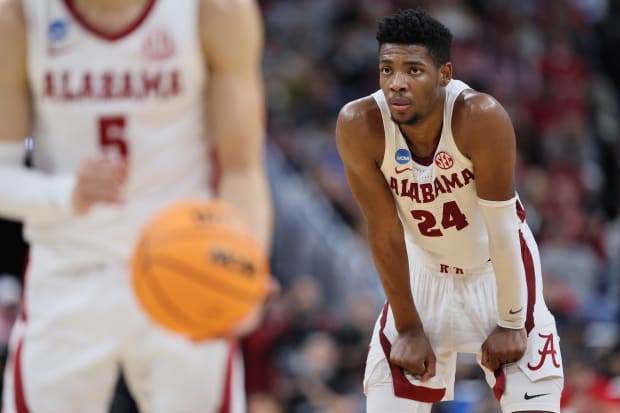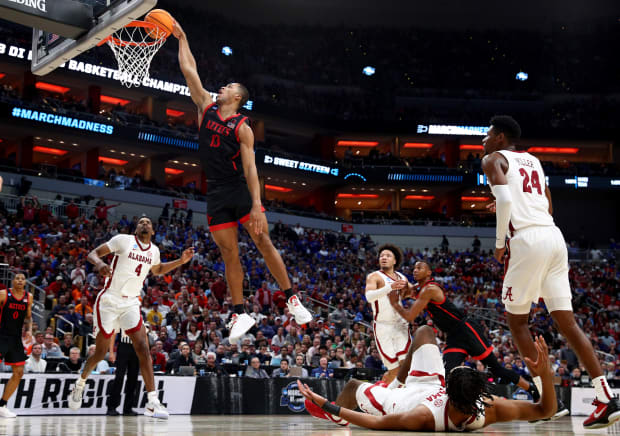LOUISVILLE, Ky.—Alabama ran into the wrong team at the wrong time.
The team is San Diego State. The time is the NCAA tournament Sweet 16. The context was the stunning ending to the No. 1 overall seed’s quest to win a national championship that would have left much of the nation holding its nose or averting its gaze.
So, yeah. Wrong team at the wrong time. Those words will be familiar to Alabama coach Nate Oats, whose “wrong spot at the wrong time” summation of star player Brandon Miller’s involvement in a fatal shootout has lived in infamy. Oats apologized when the world recoiled at how callous it sounded. One of his players, Darius Miles, had been charged with capital murder in connection with the shooting death of Jamea Jonae Harris on Jan. 15. According to law enforcement officers, Miller had transported the alleged murder weapon to the scene, and Oats treated Miller as if he’d had a curfew violation.
Maybe even less. Conceivably, a player could be suspended for a game—or a half—for missing curfew. Miller missed no playing time, Bama blundered onward through a succession of P.R. debacles, and the Tide kept winning games. As this baroque and bewildering NCAA tournament unfolded, the Red Sea parted for the No. 1 overall seed Crimson Tide to reach its first Final Four.
Then, it all came crashing down Friday night in a 71–64 upset loss to the No. 5-seeded Aztecs. In the final analysis, Alabama sacrificed every shred of its institutional integrity for a meager Sweet 16 run. That’s not a great return on the mortgaging of a reputation. But then again, this is the pattern for the Tide under Oats: NCAA tourney upset losses that transpire well short of the expected performance.

Andy Lyons/Getty Images
In 2021, his first season leading Alabama to the Big Dance, the No. 2-seeded Tide lost in the Sweet 16 against No. 11 seed UCLA. In ’22, sixth-seeded Bama lost in the first round against No. 11 Notre Dame. And now, with the top overall seed in the tourney and a ransacked region there for the taking, the Tide lost a golden opportunity. That’s some serious under-performing.
“It’s a lot of really good programs in the country that have lost,” Oats said after the game when asked about the increasingly sketchy March record. “I mean, we could go down the list of them. That’s what makes the NCAA tournament the NCAA tournament. They’re all good teams.
“A lot of programs would love to be in the NCAA tournament three straight years. A lot of them would have loved to have won the SEC regular season and tournament two of the last three years. We’re doing pretty good things at Alabama, and we’re going to continue to get better.”
If they’re going to get better in the future, it will be without Miller. He will soon be gone to the NBA, and he is leaving in an inglorious blaze of poor play.
Miller’s three-game NCAA tourney performance is not befitting of a top-five pick. He made just eight of 41 field goal attempts, a ghastly 19.5 percent—just five of 22 inside the arc and three of 19 outside it. He averaged 9.3 points—less than half his season average—and had 10 turnovers.
His final college game was a wreck: nine points on three-for-19 shooting, 11 rebounds, three assists and six turnovers. When Alabama was searching for some late-game magic to rally from a nine-point deficit, Ohio transfer Mark Sears became the go-to guy. This told you how far off the rails Alabama had gotten offensively.
“I think we came in this game prepared as much as we can,” Miller said. “I think our shot-making could have been better. Our shot choices could have been better.”
So many of Alabama’s choices could have been better over the past two-plus months. Miles, according to investigators, asking for his gun and giving it to his friend, Michael Davis, precipitating the shootout that killed Harris. The alleged refusal of Miles, Davis, Miller and the third Crimson Tide player at the scene, Jaden Bradley, to leave before an altercation escalated into a tragedy. The decision by the school not to disclose that Miller and Bradley were at the scene, or to discipline them in any way, leaving the issue to explode late in the season and overshadow everything this team did. (Miller’s attorney, Jim Standridge, has stated Miller had no prior knowledge Miles and Davis had been involved in a verbal altercation that led to the shooting.)
If you want to argue that the weight of playing under this buckled Miller and Alabama, well, blame the school itself for that. If it had dealt with it transparently and with anything resembling accountable discipline for Miller and Bradley, the situation could largely have been put behind the team weeks ago.

Jordan Prather/USA TODAY Sports
Instead, Oats’s idea of handling it was to weirdly call former NFL star Ray Lewis for advice on dealing with an inconvenient death, then march the full team (minus Miles) off to Nashville to play Vanderbilt three days after the killing. There would be no turning back after that.
In basketball terms, it looked like there would be no turning back before cutting down nets in Houston in early April. Then came a veteran, rugged San Diego State team that was ready to go blow-for-blow with Bama and didn’t blink when the game tilted toward the Tide.
After trailing by five at halftime, Alabama put together one of its trademark runs for a 48–39 lead with 11:30 minutes left. At that point, the Aztecs appeared to be out of offensive options and defensive answers.
But after a Brian Dutcher timeout, Seattle transfer Darrion Trammell launched an eight-point run. San Diego State kept coming, seizing the lead with 8:43 to go and never relinquishing it. It was a stellar exhibition of poise and toughness, and Alabama looked startled that the Aztecs had not wilted like so many other opponents.
As SDSU made all the winning plays in the final minutes, the Alabama majority of the crowd in the KFC Yum! Center started filing out. At the final horn, Miller untucked his jersey, walked to the back of the Crimson Tide handshake line, and shook every San Diego State hand. He retreated to the bench, grabbed an NCAA towel and headed to the locker room, his college career assuredly over.
After the NCAA-mandated cooling off period expired, Miller and Charles Bediako exited the locker room en route to the interview room. Miller had the NCAA towel draped on his head, eyes a bit red, as he walked through the crowded hallway area. Oats did an interview with CBS sideline reporter Evan Washburn in the hallway, and the two hugged before Oats joined his players on the podium.
After a seven-question interview session, the Crimson Tide contingent exited back to the locker room. Their season was over.
The NCAA tournament can proceed without them, a cloud lifted, a shining moment ahead for someone other than the program that sacrificed its discipline in search of a title it didn’t come close to winning.







